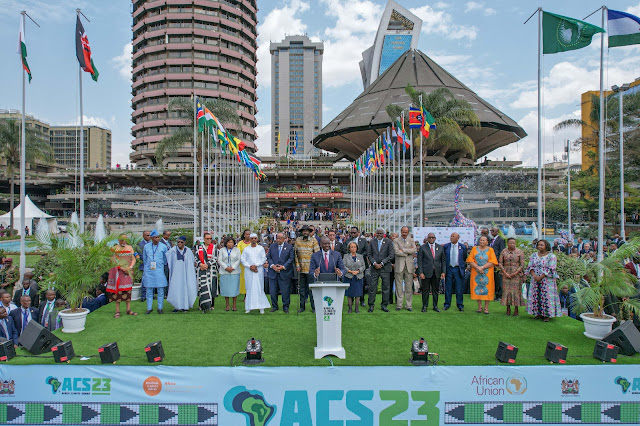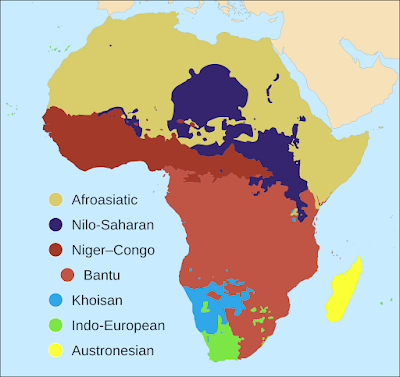Africa Climate Summit: A United Front for Climate Action
 |
| Kenyan President William Ruto addresses the media during the Africa Climate Summit. Photo: Presidential Communication Service, Government of Kenya |
The inaugural Africa Climate Summit, held from 4th to 6th September in Nairobi, concluded with a resounding call to action. World leaders, international organisations, and civil society converged to discuss the continent's unique position in the global fight against climate change. The summit culminated in the Nairobi Declaration, a document that will serve as Africa's negotiating stance at the upcoming COP28 summit.
The three-day event, hosted by the Kenyan government and the African Union, saw participation from global figures including UN Secretary-General António Guterres, President of the European Commission Ursula von der Leyen, and African Development Bank President Akinwumi A. Adesina. Their collective message was clear: Africa is central to the global climate solution.
Africa's Unique Position
Kenya's President William Ruto highlighted Africa's potential, noting the continent's vast renewable energy assets and its youthful population. "Africa is the continent with 60% of the world’s renewable energy assets... We have the largest carbon sequestration infrastructure in the world,” Ruto emphasised.
However, despite its minimal contribution to global carbon emissions, Africa bears a disproportionate brunt of climate change effects. Guterres stressed the need for developed countries to double adaptation finance by 2025, urging greater climate ambition from different actors around the world.
The Nairobi Declaration
The declaration, a significant outcome of the summit, calls for a global carbon tax regime, including taxes on fossil fuel trade, maritime transport, and aviation. It also advocates for the establishment of a global financial transaction tax. These measures aim to generate large-scale financing for climate-related investments, insulating the issue from geopolitical and domestic pressures.
Human rights activist Graça Machel lauded the declaration, stating, "Africa is not here to be helped. Africa is here to offer opportunities, to offer investment, to offer solutions."
However, the document stopped short of calling for a complete phase-out of fossil fuels, reflecting the tension between countries advocating for renewable energy and those viewing fossil fuels as essential for economic development.
Financial Commitments and Future Actions
The summit witnessed significant financial pledges. The Abu Dhabi fund, Etihad Credit Insurance, Masdar, and AMEA Power committed to developing 15 Gigawatts of clean power by 2030, catalysing at least an additional $12.5 billion from various sources.
Special Envoy John Kerry announced the Biden administration's contribution of $3 billion annually for adaptation, with an additional $30 million to bolster climate-resilient food security efforts across Africa.
However, African leaders acknowledged that these investments barely scratch the surface of the continent's financial needs.
Fossil Fuels: A Contentious Issue
 |
| President Yoweri Museveni launches commencement of drilling at an oil well in Western Uganda in January 2022. Courtesy Petroleum Authority of Uganda |
The summit's discussions largely sidestepped the topic of fossil fuels. While countries like Kenya champion renewable energy, others like Nigeria, Angola, and South Africa have significant fossil fuel interests. Akinwumi Adesina, president of the African Development Bank, emphasised the importance of gas as part of Africa's energy mix, stating, "Africa needs stable grids to industrialise. Gas is a very critical part of the energy mix.”
Looking Ahead
The Africa Climate Summit has set the stage for the continent's unified stance at COP28. With the Nairobi Declaration in hand, African leaders are poised to demand greater commitment from major polluters and advocate for the financial reforms necessary to combat climate change.
The summit's focus on finance, while crucial, must be complemented by actionable frameworks and broader discussions on the challenges facing Africa. As the world gears up for COP28 in Dubai, all eyes will be on Africa, a continent poised to lead the charge in the global fight against climate change.
_WITH_JOURNALISTS_AT_THE_6TH_ZIONIST_CONGRESS._SEATED_NEXT_TO_HIM_IS_Z._WERNER,_EDITOR_OF_THE_ZIONIST_PAPER,_DIE_WELT._%D7%AA%D7%90%D7%95%D7%93%D7%95%D7%A8_%D7%94%D7%A8%D7%A6.jpg)

Comments
Post a Comment